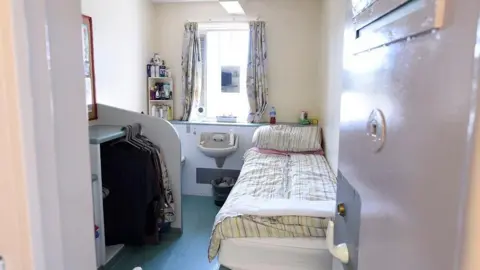Hydebank prison goes from failing to top ratings
 Michael Cooper
Michael CooperThe Hydebank Wood prison facility in Belfast has been given top ratings in independent inspections – a decade after it was described as failing.
The site holds about 150 women and young men across two premises.
Inspectors found it safer and operating more successfully than similar facilities in England and Wales.
Justice Minister Naomi Long said improvements were the result of “many years of hard work” by the Prison Service and its partners.
"Just over 10 years ago inspectors described Hydebank as a failing prison – today it is a model of excellence and good practice," she said.
“There is no doubt the exceptional work being done at Hydebank is transforming lives."
Long told the BBC's Good Morning Ulster programme there had been a "culture shift" in how inmates are referred to within the prison system.
"We talk about people who have been committed to 'our care', because we recognise that many of those people who come into prison have complex needs."
 Michael Cooper
Michael CooperVisits to both parts of the prison were unannounced and involved Criminal Justice Inspection (CJI) Northern Ireland and His Majesty’s Inspectorate of Prisons.
Jacqui Durkin of CJI said inspectors were "impressed" by what they found.
“We identified evidence of our expectations being met and 10 examples of notable practice that other prisons may be able to learn from," she said.
Ms Durkin added that “quality relationships” between staff and prisoners were “at the heart of the success”.
Prisoners had their cells unlocked for at least eight hours a day and most participated in training, education and work opportunities.
Only one serious assault was recorded in the past year and most violent incidents were described as “low level”.
It's 10 times different - prisoner
One prisoner in Hydebank Wood said there are "good opportunities" with various projects on offer to the inmates.
Dylan said he has qualifications in barbering, cooking, and painting and decorating.
He added there is good support within the prison.
"If you ask for it, you'll get it, it's all about asking for it."
Dylan told BBC News NI that the system at Hydebank Wood is "10 times different" from other institutions and prisons he has been in.
"I was always in and out of trouble in the block... but now I am changed. I am doing well... it's hard to get down here but it was worth the wait."
Asked what advice he would offer anyone coming to Hydebank Wood he said: "Keep your head down, do what you're doing, get out and don't come back... take the opportunities."
 Michael Cooper
Michael CooperInspectors did identify six "key concerns" where Hydebank could improve.
One was "a need for greater scrutiny of incidents involving the use of force".
They said current arrangements were “not robust and could not assure prison leaders that force was always necessary, proportionate and used as a last resort”.
Ms Durkin said: “Overall, this was a very positive inspection and it is a pleasure to report on a prison that despite an increased population with some complex needs, was operating far more successfully than most similar prisons inspected in England and Wales."
'Good ideas acted upon'
The justice minister said all of the improvement recommendations made in the report "have been responded to or are being responded to".
Long said Hydebank's deputy governor would review every incident where restraint was used to check "whether or not it was required or what alternative methods could have been used".
"One of the things that they referenced in the report was the willingness of Prison Service to actually listen and learn and I think that's why they've got such a good report on this occasion," she added.
The minister also attributed some of Hydebank's success to the dedication and innovation of its staff.
"If people are working as a prison officer and have good ideas, those ideas will be captured and put into practice," she said.
Long explained she had seen examples of prison officers who see a problem and "come up with a solution", which was strongly supported by management.
"I think it's really positive to see because it means our prison officers aren't just there to lock people up at night and let them out in the morning," she added.
"They're actually there working with the prisoners, they know their particular needs and challenges and they're able to provide both support, encouragement and challenge about their offending behaviour that actually means they're much more likely to not come back."
